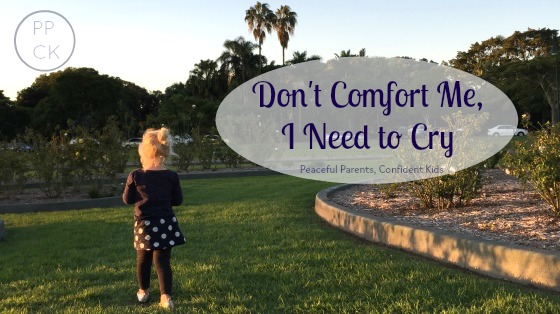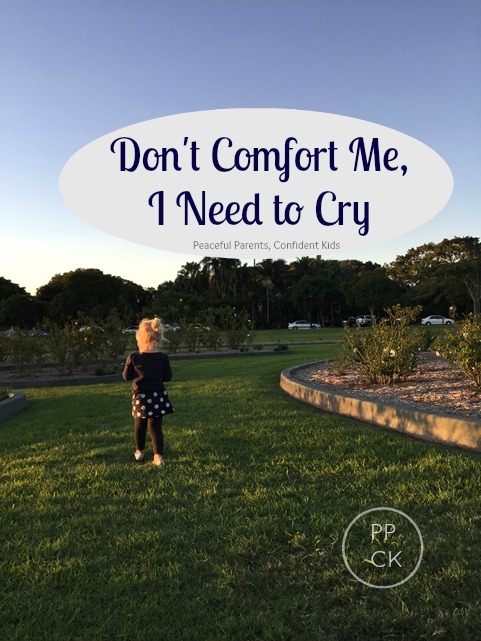It is difficult as a parent to hear your child in distress, but what’s even harder is when, despite their obvious emotional turmoil, they refuse your comfort. That rejection can instantly make a parent feel like a failure. Comforting pain and hurt is supposed to be part of our parenting role, isn’t it?
So what’s a parent supposed to do if their child doesn’t want their support when they are feeling low? And more importantly, why on earth would they not want their parent to help them when they are so distressed?

The other day I followed my distressed 3 year old into her bedroom. She screamed at me to go away, swiped her ‘lamby’ (security blankey) angrily out of my arms before picking it up and throwing it out her bedroom door. As she then tried to squeeze herself into a small gap between her dresser and her cupboard to get as far away from me as possible, I had to remind myself that there was a valid reason for her once again rejecting my offers for comfort. It wasn’t personal.
Even understanding, as I do, that the expression of emotions is normal, healthy and important in the emotional intelligence development of a child, my motherly instincts still seek to offer comfort and support to my children when they are upset.
I want them to know that I am there for them, that I hear them and that I understand. More than that I want to wrap my arms around them and hold them tight, allowing their tears to soak into my shirt. I want to be able to soothe their cries; be a source of comfort for them in their time of need. I want to stay close to them to be able to dry those tears when the emotional wave they are riding has passed.
But I am learning that when that wave strikes, timing is critical when it comes to being able to offer comfort and in some cases, when they are in the throws of emotional distress, comfort is the last thing they want or need.
Sometimes the emotions spilling over are not a direct result of the main event contributing to the outburst. Sometimes, the hurt goes deeper and further back through the day and sometimes weeks. Sometimes, the child in distress needs to ride that wave all the way into shore before achieving the full feeling of therapy that a good cry can enable.
Sometimes, the comfort we provide them is a like a life raft seeking to rescue them from the depth of their wave prematurely. Sometimes we need to remember that our children do not need to be rescued from their wave, that they are more than capable of riding it through to the end and sometimes this is exactly what they need to do to feel better and move on.
I have a good relationship with Miss 3. We enjoy each other’s company and have a deep and close connection. In her bedroom that day, she was upset because her sister had told her she would never, ever, ever be her best friend again, which I get; That’s hard to hear. She hears it regularly as immaturity restricts my eldest from coping with her own disappointments without feeling the need to cause her sister to feel the same hurt.
In other instances, it could be that she has slammed her finger in the sliding door, or dropped a book on her toe or in some cases she could be upset because I have had to enforce a limit and she has had to do something she has not wanted to do. In the latter cases I can fully understand why she would be angry with me and not desire my comfort but even in the other moments she is perfectly right to stop me comforting her.
You see, some of it is to do with her personality. She is quite introverted and likes being in her own company. Her need for personal space when playing with others is usually quite significant.
But, more than this – sometimes she simply wants to cry; she needs to cry. She does not want to risk having something make her feel better prematurely, before she has had a chance to tap into the therapeutic benefits of a good long cry.
We are used to living with an emotional child. Miss 4 wears her heart openly on her sleeve. She expresses her emotions clearly, fully and without reserve. There is rarely a question over what is ailing her as there is normally very little delay between when she first feels the emotion and when she has let it out for the world to hear.
Her emotional waves are steep, peaking much like a shallow ocean wave does before dumping down onto the sand below. She usually seeks out comfort from her waves. They scare her and she likes to feel safe and secure whilst she is on the ride. Once the wave has crashed, however, she is over it and you could be forgiven for thinking you had imagined the whole thing, such is the change in her demeanour.
But, whilst, Miss 4’s emotions come out regularly throughout the day in short, sharp bursts, Miss 3 often sails through the day on much calmer waters. There are small peaks and troughs but most of these cruise by her without incident. It is not that she does not experience emotion at these times, she just keeps it in check, preferring to store it inside rather than release it as her sister so confidently does.
It is therefore important to her that when she finally does get a chance to release those emotions, she is free to do so fully. She has to make the most of these moments. When she hits her emotional wave, it swells bold and wide like the swollen waves you might find in the deep water on rough seas. There is no real peak to speak of and no inevitable crash.
Often, when the end of her wave is nearing, Miss 3 will stop crying out momentarily, distracted by her surroundings which are now taking over her once clouded vision. She will then desperately try to claw her way back onto her wave, forcing out more cries, loathe to let it end too soon.
In her bedroom that day, my daughter worked through her emotions. I gave her space to do that. I let her know I could hear her frustrations and would be there for her if she needed me. Then I went about my chores. I occasionally checked in with her but each time was met with, “Go away!” After about 45 mins, she came to me and held out her doll to me asking if I could dress her. It was her way of letting me know she was ready to communicate. I went with her to her room and sat with her. Not pushing, just waiting.
10 minutes later she came to me and sat on my lap. I held her and without saying a word, showed her empathy and understanding. I could tell she appreciated it. I could tell she was relieved that I had got her message:
“Don’t comfort me, I need to cry!”
You might also enjoy reading:
Coping With a Toddler’s Emotional Outbursts ~ Kate Russell (Peaceful Parents, Confident Kids)
When Extreme Emotions Take Over a Toddler ~ Kate Russell (Peaceful Parents, Confident Kids)
Supporting an Emotional Child: A Step by Step Guide for Parents ~ Kate Russell (Peaceful Parents, Confident Kids)
Braving the Silence (The Secret to Nurturing Emotional Resilience) ~ Janet Lansbury (Janet Lansbury – Elevating Childcare)
The following books inspire my peaceful parenting (Affiliate Links):
No Bad Kids: Toddler Discipline Without Shame
How to Talk So Kids Will Listen & Listen So Kids Will Talk


It sounds like you have very close and amazing connection with your children. It’s very interesting to read what other families experience on a deeper level!
Yes, true, timing is so important, and catering to different children and their personality.
I love this article! I really appreciate more of what you DON’T say. That you don’t tell your daughter, “there there, it will be alright” or “you’ll be okay” (common phrases in the states). I really appreciate this fine example of allowing her time to work though whatever is frustrating her and not forcing her to get over it quickly or dismissing her frustration as un-important.
It DOES sound like they are growing a healthy emotional understanding of themselves and as they grow up, that strength will continue to shine brighter and brighter!
Pingback: Coping With a Toddler's Emotional Outbursts: Acknowledging Emotions
Pingback: Learning to Love a Child's Meltdown
Pingback: Respectful Parenting: Have I Made a Mistake?
Pingback: Article Share: Don’t Comfort Me, I Need to Cry | The Nan Tolbert Nurturing Center
I loved your article for the insight it provides me for future parenting. I’m in my 20s but when I was a teen I went through a situation where I completely broke down an sobbed. I wasn’t a kid prone to crying but I had been under a lot of strain. A teacher found me an tried to comfort me. She wouldn’t go away. I just wanted to disappear. I felt ashamed to be crying in front of an adult. I wasn’t used to being overtaken by emotion. The teacher made me go talk to the guidance counselor. I didn’t get to finish my cry. I choked it down. I’ve never really recovered. It still bothers me. So going through that I see the significance of whet you wrote in this article. Will try to apply it when dealing with others
I’m in the thick of this at the moment. My daughter screams as i get closer and pushes me away….she never wants a hug….when shes screaming how do I show her I’m there when she won’t let me look at her? I feel mean walking away? So tricky!